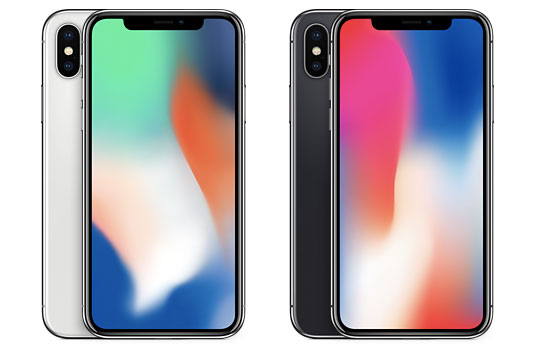Hosted by site sponsor WebMate.
iPhone Q&A
Published November 14, 2017
All Apple Q&As >> iPhone Q&A (Home)
To be notified of new Q&As, sign up for EveryMac.com's bimonthly email list.
How fast are the iPhone 8, iPhone 8 Plus, and iPhone X models compared to one another? How fast are they compared to earlier models?
The iPhone 8, iPhone 8 Plus, and iPhone X each have been discontinued. However, this Q&A is up-to-date and can be quite helpful for anyone buying or selling one of these devices on the used market.
In a pair of press releases for the iPhone 8/iPhone 8 Plus and the iPhone X, Apple proclaims that these mobiles have a new Apple A11 "Bionic" processor.

Photo Credit: Apple, Inc. (iPhone X)
Apple more precisely claims:
A11 Bionic, the most powerful and smartest chip ever in a smartphone, features a six-core CPU design with two performance cores that are 25 percent faster and four efficiency cores that are 70 percent faster than the A10 Fusion, offering industry-leading performance and energy efficiency. A new, second-generation performance controller can harness all six cores simultaneously, delivering up to 70 percent greater performance for multi-threaded workloads, giving customers more power while lasting two hours longer than iPhone 7. A11 Bionic also integrates an Apple-designed GPU with a three-core design that delivers up to 30 percent faster graphics performance than the previous generation.
As much as 70% greater performance than the iPhone 7 released the previous year definitely sounds impressive.
Compared to each other, though, one who pays attention to details would notice that Apple used the exact same copy about the processor for both the iPhone 8/iPhone 8 Plus and iPhone X press releases and this would be a good hint that compared to one another, the iPhone 8/iPhone 8 Plus and iPhone X provide effectively identical performance.
Because the iPhone 8/iPhone 8 Plus and iPhone X have the same processors and graphics processors, the only real remaining performance-related variable is that the iPhone 8 has 2 GB of RAM whereas the iPhone 8 Plus and iPhone X have 3 GB of RAM, but the higher-end models have larger displays that largely negate the benefit of extra RAM.
Consequently, it is a reasonable assumption that these three models are effectively the same speed. Nevertheless, independent benchmarks can be helpful for confirmation. Benchmarks also can be helpful to verify Apple's official claim and evaluate the performance increase compared to earlier iPhone models like the iPhone 6 and iPhone 6s as well as the iPhone 7 that Apple compared.
Benchmark Performance Overview
For a solid general overview of the performance differences between the iPhone 8, iPhone 8 Plus, iPhone X, earlier iPhone models, and even the iPod touch and iPad lines, Everyi.com's own Ultimate iComparison makes it quick to compare side-by-side Geekbench benchmark averages for hundreds of possible performance comparisons.
The Geekbench 4.0 benchmark confirms that the iPhone 8, iPhone 8 Plus, and iPhone X models effectively are the same speed, with the iPhone 8 and iPhone 8 Plus popping out slightly faster numbers than the more expensive iPhone X. The difference is imperceptible in day-to-day use, though.
Compared to other recent iPhone models, the iPhone 8, iPhone 8 Plus, and iPhone X are faster across the board:
| iPhone 8/8+/X Compared To: | Percent Faster (Single Core) |
Percent Faster (Multicore) |
| iPhone 6/iPhone 6 Plus | 187% | 308% |
| iPhone 6s/iPhone 6s Plus | 76% | 147% |
| iPhone 7/iPhone 7 Plus | 22% | 75% |
| iPhone SE | 70% | 137% |
| iPad (5th Gen) | 64% | 127% |
| iPad Pro 10.5" | 8% | 9% |
| MacBook (Core m3, Mid-2017) | 18% | 48% |
With an evaluation of the above, you clearly can see that the Geekbench 4 benchmark demonstrates impressive performance gains for the iPhone 8, iPhone 8 Plus, and iPhone X compared to the iPhone 7/iPhone 7 Plus as well as entry-level iPad Pro and MacBook models.
Performance Summary
Ultimately, the iPhone 8, iPhone 8 Plus, and iPhone X roughly are the same speed and provide a massive performance increase compared to all earlier iPhone models. Apple's estimate of up to 70% faster performance than the iPhone 7 is reasonable.
The iPhone 8, iPhone 8 Plus, and iPhone X models even are faster than the 10.5" iPad Pro and entry-level "Mid-2017" MacBook models. They definitely provide an impressive year-over-year performance boost.
Also see: What are the major differences between the iPhone 8, iPhone 8 Plus, and iPhone X? Which is best for me?
Permalink | Report an Error/Typo | Sign Up for Site Update Notices
<< iPhone Q&A (Main) | All Apple Q&As
Established in 1996, EveryMac.com has been created by experts with decades of experience with Apple hardware. EveryMac.com includes, and always has included, original research incorporating detailed, hands-on inspection of packaging, computers, and devices as well as extensive real-world use. All information is provided in good faith, but no website or person is perfect. Accordingly, EveryMac.com is provided "as is" without warranty of any kind whatsoever. EveryMac.com, and the authors thereof, shall not be held responsible or liable, under any circumstances, for any damages resulting from the use or inability to use the information within. For complete disclaimer and copyright information please read and understand the Terms of Use and the Privacy Policy before using EveryMac.com. Copying, scraping, or use of any content without expressed permission is not allowed, although links to any page are welcomed and appreciated.
